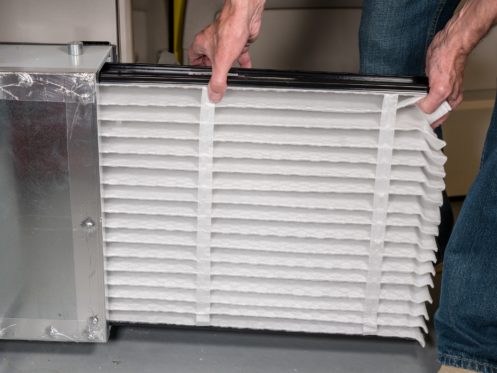The winter season inflicts a lot of wear and tear on your heating system. You depend on your HVAC system to heat your home and to protect you from freezing outdoor temperatures. One of the essential components that contributes to the proper working of your HVAC system is the air filter. As your heating system runs all year round, air flows through furnace filters, which trap fine particles. These filters eliminate dust and debris that can build up inside your system and clear pollen, pet dander, dust, and other substances from your home to improve indoor air quality.
Changing the air filter routinely is a good idea because it keeps your HVAC system and indoor air healthy and safe. During winter, you may have to replace your air filter regularly because your system will be in constant use throughout the heating season. In California, winters are sometimes relatively mild and other times harshly cold. The outdoor temperature and the extent to which you use your heating system during the heating season will considerably impact how frequently you replace the filter.
Read on to find out why you should change the filters and how often you should perform this crucial HVAC system maintenance task.
Reasons to Change the Air Filter
Replacing your air filter is an integral aspect of HVAC maintenance that your cooling and heating system needs from time to time every year. Depending on the kind of heating unit you use, you may have a reusable or disposable filter. Most traditional air forced furnaces or heat pump systems have disposable filters. Reusable air filters are common in ductless systems and may comprise a thin, metallic, perforated sheet that you remove, clean, or replace.
Irrespective of the type of filters your system uses, it’s important you understand why filters are essential and how they function to eliminate dust, pollen, dirt, and other debris from your indoor air.
Although your heat pump, furnace, or air conditioner may seem functional, your system depends on fragile internal components that may stop functioning correctly if they become damaged or clogged. Thus, air filter replacement helps your system work efficiently while reducing your utility bills and prolonging the life of your heating system.
The air filter removes pollutants as the air flows within the unit. Although the air filter’s primary role is to protect the delicate inner components of your furnace, it helps you enjoy filtered indoor air. But when the air filter becomes clogged with dirt, its ability to allow adequate airflow throughout your heater gets hampered. As a result, your HVAC equipment tends to work longer and harder to push the air via the filter and then to circulate it throughout your home. This results in energy wastage, stress on components, and spaces that don’t heat sufficiently. Changing the air filter encourages proper air purification, helps balance pressure within your heating system, and minimizes static buildup.
What Might Happen If You Fail to Change Filters?
In most instances, homeowners forget to change air filters due to their busy schedules. Although this may not sound like a critical matter, it can cause significant problems for your cooling and heating system. Always have extra filters on hand, and get ready to change them as soon as they become dirty. Here are some problems caused by the failure to change HVAC filters.
Increased Energy Costs
When the air filters become dirty, air that flows through the system can push particles further into the heater, where dust and other debris can accumulate onto components within the heating system. When the internal components become dirty, their efficiency reduces, forcing the entire unit to work longer to produce the heat your home needs. Consequently, your utility bills may skyrocket.
Poor Indoor Air Quality
Clogged filters lose their efficiency and ability to remove pollutants, allowing harmful particles to circulate throughout your home. You may notice increased levels of dust or aggravated allergy and asthma symptoms if you don’t replace the air filters as recommended.
Uneven Heating
Dirty filters can considerably obstruct airflow to inhibit heated air from flowing all over your home. Grime and dust can even coat the interior surfaces of ducts, forming full clogs. Either issue can result in cold spots in your home because air pressure may not circulate evenly throughout the house. Areas furthest away from your heater are more likely to become cold and uncomfortable if the filters get clogged.
Increased Risk of Unexpected System Failure
When dirt builds up in your HVAC system, it can stress crucial components. As a heating unit with unclogged air filter and obstructed airflow tries to warm your home, it can overheat, turn off unexpectedly, or even damage the heat exchanger and other internal components. Each of these problems is serious, and you may need to call for emergency repair services to restore heat.
Reduced Furnace Life
If you want to use your furnace for long, changing the air filter is crucial. Running an HVAC system with a clogged filter can lead to problems that require costly repairs or even reduce the service life of your system. Regular filter replacement and professional tune-ups help minimize wear and tear, extending the life of your heater.
When to Change Air Filters
Various factors, including filter type, size, thickness, MERV rating, and household size, determine how often you need to change the furnace filter. If you live with allergic people or pets, you may need to make regular filter changes. If you’re doing home renovations, you might also consider changing the air filters regularly.
Based on the type of filter you have, you might have to change it as often as every month or as occasionally as every six months to one year. The heating season becomes hard on heaters and their filters since most people run their heating systems round the clock. Higher levels of HVAC system usage can fill up filters quickly, so inspect your filter every month, and change it as required.
How to Replace the Air Filter
Changing the air filter is an easy job that you can do on your own. However, it’s essential that you replace the old filter with a new one of the same size, so ensure you note the size indicated on the old filter and take that information to the store when picking up a replacement. Before you select a new filter, check the marks on the existing filter, and read the instructions given in the owner’s manual to ensure you pick the correct model for your system. Your system may not function correctly if you choose a filter with a high MERV rating. The replacement filter needs to fit perfectly in the cabinet and allow air to flow through easily.
Steps to Change the Air Filter
- Locate the air filter compartment on your HVAC system. This compartment is commonly found on the return side, where the air gets into the unit for heating.
- Remove the air filter, and dispose of it. If you have a reusable filter, clean and dry it per the manufacturer’s guidelines.
- Uncover the new filter, and place it into the filter compartment. Ensure the arrows on both sides of the system move in the same direction airflow moves as it circulates through the unit.
- Close the air filter compartment.
Maintain Your Heating System This Winter
Replace your air filter more regularly during winter to keep your California home healthy and your HVAC system functioning optimally. To learn more about air filters and general HVAC maintenance, contact Huft Home Services today. We offer top-notch furnace installation, repair, and maintenance services in Sacramento and neighboring areas.




